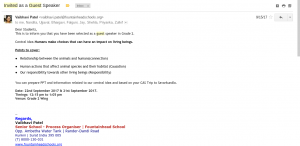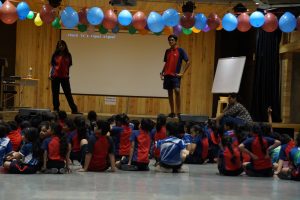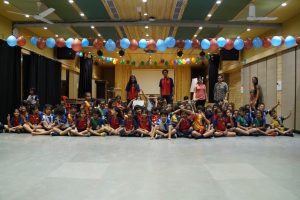Guest Speaker for Grade 2:
I was invited, along with a classmate (Nandita Goyal), to give a presentation/speech to students of grade 2 on the topic ‘Humans make choices that can have an impact on living beings’. We were asked to give these presentations twice, to different sections of grade 2.

(The email we received for giving the speech)
The reason I was excited about this was that it was with children. This topic seemed quite basic to me, without much depth and space for discussion. However, through experiences with younger cousins, I’ve known that the wild imaginary capabilities and wonder of children could surely make this quite an enriching and interesting, and indeed that was how it was. The participation from the children was much more than I expected, and there were a lot of perspectives given. From the standpoint of them being done with children of Grade 2, the discussions we had were quite a fascinating and deep. The children brought in some personal anecdotes, stuff that they had learnt from their parents or relatives, and they were quite interested in listening about our story of the Savarkundla CAS trip, where we built covers for wells so that animals wouldn’t fall into them. There were some difficulties in terms of discipline, being simplistic in the ideas we deliver (given the young audience), and being open-minded about the issue so that the children themselves could come to their own conclusion regarding the topic. Overall, this experience was both enjoyable and fascinating.

LO1 and 2:
Because of the children being from grade 2, we were asked to speak more of Hindi rather than English. This felt rather difficult to me because concepts we’ve been learning for so long in English were not that easy to translate to in Hindi, however, eventually, I tried to use a mix of Hindi and English, and use synonyms instead of complicated words to overcome this problem. This reflection during the first presentation made my second one much more smooth and understandable.
The students were all very excited to speak, and it was difficult for us to get everyone’s opinion, given the time constraint. But we also had to give chances to those who want to speak, because they deserve to be heard just as much as everyone else. So trying to keep the balance in being able to both deliver all of our content and give an opportunity to everyone to speak was rather challenging. However, we came around to it by the second presentation where we took authority in the beginning and set some essential agreements so the presentations go smoothly.
LO5 and 1:
Working with Nandita made some tasks easier for me. We could divide work on the presentation, and whenever I got stuck about some point I was trying to make or when I couldn’t keep the decorum in the hall, she’d step in and help. She’d often give counter proposals to my opinionated statements too, which helped make the discussions more deep given the multiple perspectives the children can look at this issue from. She was really enthusiastic about working with children too, and she was much better at handling them. That went a long way in keeping the children focused on the issue that we were talking about, and made the presentation go smoother. I realised that I had to connect better with my audience.

LO6:
Our topic is: ‘Humans make choices that can have an impact on living beings’. This issue has been discussed for decades if not centuries. Today the major aspect of the discussion is the impact of global warming on Earth, and other minor aspects include the destruction of habitat due to deforestation, killing creatures for food, and various different consequences of the urbanisation of humanity. Discussing this issue with children and making them realise the importance of this issue can go a long way in making them live a life of ‘lesser impact on living beings’ and even do something significant about the issue when they grow up.
LO7:
One aspect where we hit an ethical issue was the problem of eating non-vegetarian food. Eating non-veg, at least in places where you can easily get vegetarian food, is an impact that can be dealt with. However given that the families of some children did eat non-veg, we were stopped before we could talk a lot about this topic. Now I’m not against eating non-veg, however, I believe that not talking about this issue just because it might seem insensitive to the parent is not right. A child, at least in case of issues with such a vast scale of impact, should have a right to make their own decisions through full disclosure of every perspective. Some might say children are too young to make that decision, but I decline because, at least when there are no great consequences of making the other choice, everyone should independently make their own decisions.